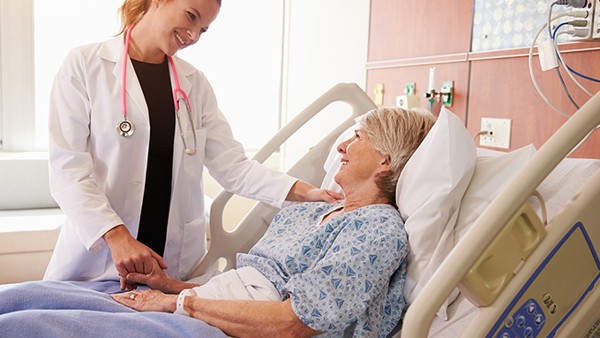If Endometrial Lesions Are Not Treated, They Can Easily Turn into Cancer

Endometrial cancer "falls in love" with eight types of women
Endometrial cancer is a common malignant tumor of the female reproductive system. It is the most common gynecological malignancy in developed countries, and its incidence has been increasing in recent years.
The main cause of endometrial cancer is endometrial hyperplasia, which is a benign proliferation of the endometrium. Endometrial hyperplasia can be caused by a variety of factors, including hormone replacement therapy, obesity, diabetes, and hypertension.
If endometrial hyperplasia is not treated, it can progress to endometrial cancer. The risk of progression to cancer is about 5-10%.
Symptoms of endometrial cancer
The most common symptom of endometrial cancer is abnormal vaginal bleeding. This can occur at any age, but it is most common in women after menopause.
Other symptoms of endometrial cancer include:
Pelvic pain
Abdominal bloating
Vaginal discharge
Weight loss
Fatigue
Diagnosis of endometrial cancer
Endometrial cancer is diagnosed through a biopsy. A biopsy is a procedure in which a small sample of tissue is removed from the endometrium and examined under a microscope.
Treatment of endometrial cancer
The treatment of endometrial cancer depends on the stage of the cancer.
Early-stage endometrial cancer (stage I or II) can be treated with surgery alone.
Advanced-stage endometrial cancer (stage III or IV) may require surgery, radiation therapy, and/or chemotherapy.
Prognosis of endometrial cancer
The prognosis of endometrial cancer depends on the stage of the cancer and the patient's overall health. The 5-year survival rate for early-stage endometrial cancer is about 90%. The 5-year survival rate for advanced-stage endometrial cancer is about 60%.
Prevention of endometrial cancer
There is no sure way to prevent endometrial cancer, but there are some things you can do to reduce your risk. These include:
Maintaining a healthy weight
Eating a healthy diet
Getting regular exercise
Avoiding hormone replacement therapy
Managing diabetes and hypertension
If you have any of the symptoms of endometrial cancer, see your doctor right away. Early diagnosis and treatment can increase your chances of a successful outcome.
Endometrial cancer "falls in love" with eight types of women
Endometrial cancer is a type of cancer that forms in the lining of the uterus. It is the most common gynecological cancer in the United States, and it is estimated that over 60,000 women will be diagnosed with endometrial cancer this year.
There are a number of risk factors for endometrial cancer, including:
Age: The risk of endometrial cancer increases with age, and most cases are diagnosed in women over the age of 50.
Obesity: Obese women are at an increased risk of endometrial cancer.
Diabetes: Women with diabetes are at an increased risk of endometrial cancer.
High blood pressure: Women with high blood pressure are at an increased risk of endometrial cancer.
Hormone replacement therapy: Women who take hormone replacement therapy (HRT) for more than 5 years are at an increased risk of endometrial cancer.
Tamoxifen: Women who take ***, a drug used to treat breast cancer, are at an increased risk of endometrial cancer.
Lynch syndrome: Women with Lynch syndrome, a genetic disorder that increases the risk of colon and endometrial cancer, are at an increased risk of endometrial cancer.
Symptoms of endometrial cancer
The most common symptom of endometrial cancer is abnormal vaginal bleeding. This can occur at any time, but it is most common in women after menopause. Other symptoms of endometrial cancer include:
Pelvic pain
Abdominal bloating
Vaginal discharge
Weight loss
Fatigue
Diagnosis of endometrial cancer
Endometrial cancer is diagnosed through a biopsy. A biopsy is a procedure in which a small sample of tissue is removed from the endometrium and examined under a microscope.
Treatment of endometrial cancer
The treatment of endometrial cancer depends on the stage of the cancer and the patient's overall health.
Early-stage endometrial cancer (stage I or II) can be treated with surgery alone.
Advanced-stage endometrial cancer (stage III or IV) may require surgery, radiation therapy, and/or chemotherapy.
Prognosis of endometrial cancer
The prognosis of endometrial cancer depends on the stage of the cancer and the patient's overall health. The 5-year survival rate for early-stage endometrial cancer is about 90%. The 5-year survival rate for advanced-stage endometrial cancer is about 60%.
Prevention of endometrial cancer
There is no sure way to prevent endometrial cancer, but there are some things you can do to reduce your risk. These include:
Maintaining a healthy weight
Eating a healthy diet
Getting regular exercise
Avoiding hormone replacement therapy
Managing diabetes and hypertension
If you have any of the symptoms of endometrial cancer, see your doctor right away. Early diagnosis and treatment can increase your chances of a successful outcome.
The above is all the content that the editor wants to share with you. I sincerely hope that these contents can bring some help to your life and health, and I also wish that your life will be happier and happier.
Topic: #they #treated #can










